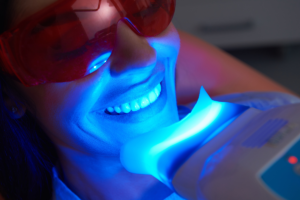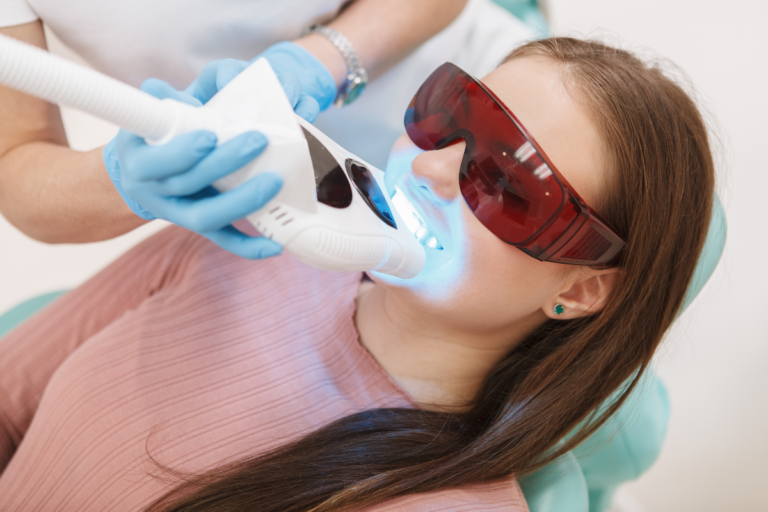The concern over potential heightened discomfort or sensitivity can cause individuals with sensitive teeth to be cautious about teeth whitening. The good news is that individuals with sensitive teeth have access to methods that allow them to achieve a whiter and brighter smile safely. Please read on to discover more about effective and safe teeth whitening options for sensitive teeth and the primary causes of tooth sensitivity.
[toc]
Causes of Tooth Sensitivity
Let’s begin by delving into the primary factors behind tooth sensitivity. This common condition affects many people and can result from various causes, including:
- Gum Recession: Tooth sensitivity may occur when the dentin (the sensitive part of the tooth) becomes exposed due to receding gums.
- Enamel Erosion: Enamel serves as the protective layer of the teeth. It exposes the sensitive dentin beneath when it wears away, leading to tooth sensitivity.
- Tooth Decay: The development of cavities, especially near the gum line, can contribute to tooth sensitivity.
- Teeth Grinding: Tooth sensitivity can also result from the gradual wearing down of enamel due to teeth grinding.
Exploring Teeth Whitening Options for Sensitive Teeth
People dealing with sensitive teeth can confidently pursue a brighter smile with the help of various tips and options tailored to their needs. Here are some of the choices to explore:
- Sensitive Teeth Toothpaste: Before teeth whitening, it’s advisable to use toothpaste designed for sensitive teeth. These toothpastes often contain ingredients like strontium chloride and potassium nitrate, which can alleviate tooth sensitivity and prepare the teeth for whitening.
- Low-Concentration Whitening Gel: Many at-home whitening kits contain high-concentration gels that can trigger sensitivity. Fortunately, there are lower-concentration alternatives available that are gentler on the teeth. Look for products with 10 percent or lower hydrogen peroxide to minimize sensitivity.
- In-Office Whitening: it may be the best choice for individuals seeking swift and highly effective results or those with severe sensitivity issues. Dentists can take measures to reduce sensitivity while using a more potent and efficient whitening gel.
- Desensitizing Products: Consider using fluoride or desensitizing gel to combat tooth sensitivity before and after teeth whitening. This approach can help individuals with sensitive teeth undergo whitening without exacerbating their sensitivity.
- Avoid Sensitivity-Triggering Foods and Beverages: Certain foods and drinks, such as coffee, soda, and acidic fruits, can intensify tooth sensitivity. Individuals with sensitive teeth should avoid these items for a few days before and after teeth whitening to minimize discomfort.
 The Effect of Teeth Whitening on Dentin Sensitivity
The Effect of Teeth Whitening on Dentin Sensitivity
Some individuals may still encounter transient sensitivity, particularly to hot and cold temperatures, following teeth whitening, even after adhering to the earlier precautionary steps. The primary reason behind this sensitivity is the opening of enamel pores during the whitening process, which facilitates the removal of stains by allowing deeper penetration of the whitening gel. Consequently, this can heighten sensitivity by exposing the dentin layer.
Typically, this sensitivity is temporary and mild, lasting a few days. To mitigate sensitivity, individuals can opt for fluoride toothpaste to fortify the enamel, use desensitizing toothpaste, and avoid consuming hot or cold foods and beverages. In more severe cases, a more potent desensitizing treatment may be recommended by your dentist.
Additional Considerations to Keep in Mind
Individuals with tooth sensitivity should consult their dentist before treatment to determine whether teeth whitening suits their needs. Sensitivity is just one of several factors to consider.
- Previous or Existing Dental Work
While teeth whitening can effectively lighten natural teeth, any pre-existing dental work, such as crowns or fillings, will retain their original color, potentially resulting in uneven discoloration. Dentists may recommend replacing the dental work to ensure it matches the newly whitened teeth.
- Breastfeeding and Pregnancy
Teeth whitening may not be advisable for breastfeeding or pregnant individuals. While there is no conclusive evidence that this procedure is harmful during breastfeeding or pregnancy, it’s best to exercise caution and postpone whitening until after breastfeeding has ceased or after giving birth.
- Medications
Certain medications, such as some antibiotics, can lead to tooth discoloration, which may reduce the effectiveness of teeth whitening. To ensure the most appropriate treatment, individuals should inform their dentist about their medications before undergoing in-office whitening.
 Contact Naples Dental Boutique for Expert Teeth Whitening Services
Contact Naples Dental Boutique for Expert Teeth Whitening Services
Experiencing tooth sensitivity should not deter individuals from achieving their goal of a whiter and brighter smile. People with sensitive teeth can undergo teeth whitening without discomfort or pain by selecting the right products and following recommended precautions. Individuals with sensitive teeth are encouraged to consult their dentist, such as the experienced team at Naples Dental Boutique, to determine the most suitable and safe teeth whitening option.
For in-office teeth whitening tailored to sensitive teeth, schedule an appointment at Naples Dental Boutique in Naples, FL. The process begins with a thorough consultation to ensure optimal results, and the professionals also provide post-treatment guidance to help patients maintain their brighter smiles for an extended period.


